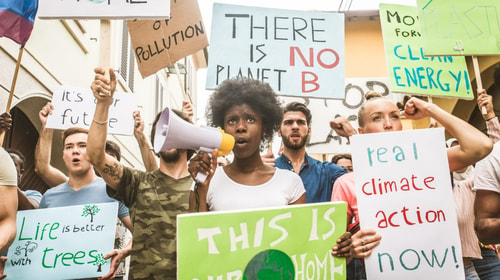Even just a few hundred years ago, around the time when the Evangelical Alliance was founded, most people didn’t travel very far from where they were born. Choices about education, career and marriage were few, and people perhaps knew a couple of hundred people personally, over the course of their lifetime. Most food was grown locally and news about global events was minimal too. In fact, many choices about life were limited.
Today, I have seemingly endless personal choices. I can wake up in Ireland and be in London or New York by lunchtime. I can work from my dining table and ‘meet’ people from across the globe on Zoom or on social media. I can’t buy milk directly from the farm across the road, but I can buy bananas from Sri Lanka in my local shop or have a new coffee machine delivered to my home within hours.
It’s a glaring understatement, but in these past few hundred years, even decades, we have lived through changes in everyday living which are unprecedented in speed and scale. Unparalleled opportunity yes, but also a time of contradiction and confusion where technology, consumerism and individualism are shaping our humanity and our planet, in ways we are only beginning to understand.
Right now, the ‘Conference of The Parties’, or COP27, is taking place in Egypt. This annual event is where world leaders and experts on the environment and climate change meet to negotiate new resolutions. Although it is 30 years since the UN Framework convention on climate change was adopted, it is only seven years since the first legally binding treaty on climate change was agreed in Paris, in 2015.
"In these past few hundred years, even decades, we have lived through changes in everyday living which are unprecedented in speed and scale."
The headline policy goal this year remains on reducing global emissions immediately and capping global temperature rises to 1.5 degrees celsius within this century. However, there are also negotiations about adaptation and resilience, justice and financial reparations, and a new commitment to a five-year global stocktake to inform future sessions of COP.
Beyond the detail, the headline warnings are stark; phrases like ‘climate chaos’ and ‘red alert’ are not limited to tabloids. Addressing the summit, the UN secretary general, António Guterres, warned that the “global climate fight will be won or lost in this crucial decade on our watch.” He didn’t stop there, employing a biblical (and soft rock lyrical) image that “humanity is on a highway to climate hell.” The Intergovernmental Panel on Climate Change (IPCC), has decreed that “the world is now in extraordinarily dangerous territory.”
This all feels apocalyptic – not least in the original Greek meaning of the word, which is about uncovering or shaking the foundations. The artificial bubble of capitalism and consumerism of the past few decades has been burst. We simply can’t go on living in a system which requires us to buy more stuff we don’t need with more money we don’t have. It is destroying our humanity and our planet.
So how do we respond to these real and urgent existential concerns as followers of Jesus? How do we develop and bear witness to a healthy and holy hope?

As Christians, we believe in the good news of Jesus, and His promise to restore and renew all things in this beautiful but broken creation. This should enable us to worry less but care more about climate change. The Bible repeatedly calls us to worship, serve and enjoy the Lord God, our Father and creator of this Earth.
Caring for creation is inescapably part of our discipleship and witness, our mandate to pursue justice and good stewardship in this specific time and place. Loving God and our neighbours well will require both small and hugely sacrificial changes to how we live our everyday lives.
Last year, the Evangelical Alliance produced a series of resources called Changing Church: Climate Change. Here you will find lots of tips to help you and your church begin, or continue, to care for creation better. Our friends at Tearfund have also produced this Climate Change toolkit for Churches. You may also find this statement by the organisation Bread for the World very helpful: A Faithful Voice on Hunger and Climate Justice
So, let’s take seriously the warnings we have been given, repent of our personal and systematic greed and serve the Lord and our neighbours with a joy and hope that is both countercultural and contagious.
"Let’s take seriously the warnings we have been given, repent of our personal and systematic greed and serve the Lord and our neighbours with a joy and hope that is both countercultural and contagious."

A prayer for COP27
It's hard to know how to pray for our hurting world, but we hope this prayer helps as we pray for change and for wise decisions to be made
Is saving souls all that matters?
Why Christians should be concerned for creation
Prioritising creation: climate change is a key gospel issue of our time
Discover how our relationship with God is directly linked to how we approach the pressing matters of our time



